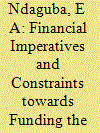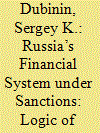| Srl | Item |
| 1 |
ID:
128309


|
|
|
|
|
| Publication |
2014.
|
| Summary/Abstract |
This article examines whether urban micro-finance institutions (MFIs) consider proxy/hidden collateral in the absence of physical as well as social collateral in judging the creditworthiness of a borrower. MFIs operating in urban slums often adopt an individual lending mechanism since borrowers are not willing to bear joint liability due to the acute problem of migration. Therefore, urban MFIs that offer individual loans are extra-cautious about minimising default risk. This article studies whether MFIs consider ownership of a room in a slum as a hidden selection criterion in a loan programme. Room ownership indicates stability in a particular location, and also indicates the income-generation capability of an aspirant borrower. We use a primary survey database collected from a non-governmental organisation, Navnirman Samaj Vikas Kendra, which provides micro-credit in four slums of north Mumbai in India. We find that the probability of getting selected in a micro-credit programme is significantly higher if a loan applicant owns a room than if the applicant lives in a rented room. MFIs appear to be more concerned about shielding themselves from default than fulfilling the broad goal of maximising social welfare by reaching the poorest of the poor. We present our study with the caveat that the results may not be generalisable, since they are based on a case study.
|
|
|
|
|
|
|
|
|
|
|
|
|
|
|
|
| 2 |
ID:
160016


|
|
|
|
|
| Summary/Abstract |
Achievable and viable peace and security efforts in Southern Africa Development Community (SADC) have been limited by an over dependence on foreign and international peacekeeping. The aim of this article is to unpack financial imperatives and constraints towards funding the SADC standby force (SADCSF). Through this the article hopes to provide lessons towards a suitable and sustainable funding mechanism aimed at addressing the financial challenges confronting African standby forces in peace operations. In particular, this article focuses on the SADCSF since its establishment in 2007. This article uses information from existing statistical and research data to first, identify existing funding models in international (regional and continental) peace operation and stand-by forces across the globe. Second, using four critical analytical frames (financial viability, the nature of regionalism, fiscal sustainability and economic landscape), the article highlights various implications of a lack of funding mechanism for regional peace and security in Africa. Third, the article shows that the following are critical to find a sustainable funding mechanism for the SADCSF: the financially demanding variable geometric nature of regional integration in Africa; the proliferation of security agencies; the complex nature of terrorism and interventions; the cost of skill acquisition and training of the multidisciplinary personnel; payment of wounded soldiers and contingents and member state tight budget. Based on international experiences and local realities expounded, this article suggests lessons towards building a suitable and sustainable funding mechanism for African peace and security in general, and regional standby forces in particular.
|
|
|
|
|
|
|
|
|
|
|
|
|
|
|
|
| 3 |
ID:
189841


|
|
|
|
|
| Summary/Abstract |
External economic sanctions have created serious challenges to the stability
of Russia’s financial system. After the first emergency anti-crisis measures,
longer-term issues are coming to the fore. At this point, the main demand for
financial services is generated by the corporate sector. However companies
are seeing supply and value production chain disruptions. Uncertainty in
the business climate is fraught with systemic risks for both the budget and
the banking sectors of Russia. Overcoming them is a strategic goal of the
Russian government and the Central Bank. Both corporate and retail lending
risks have increased. The situation requires a reorganization of the financial
intermediaries in the bank loan and securities markets.
|
|
|
|
|
|
|
|
|
|
|
|
|
|
|
|